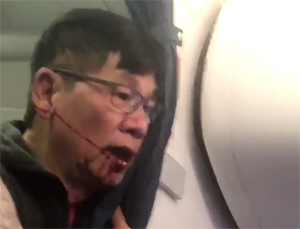New York, Apr 11: In a shocking incident, the United Airlines staff ill-treated a passenger on a plane the airline had overbooked.
As per the videos posted online by other passengers, a man was seen screaming as officers yanked him from his seat on United Flight 3411 before it departed from Chicago O'Hare International Airport to Louisville, Kentucky, on Sunday.
The man, who appeared to be of Asian origin, was seen being dragged down the aisle on his back by his hands, body limp, bleeding from the mouth, glasses askew and shirt pulled up above his navel.
The videos sparked outrage on social media, the second time in less than a month that United was criticised for its treatment of passengers.
@united @FoxNews @CNN not a good way to treat a Doctor trying to get to work because they overbooked pic.twitter.com/sj9oHk94Ik
— Tyler Bridges (@Tyler_Bridges) April 9, 2017
The incident was one of the top-trending topics on Twitter as users vented their anger towards the airline.
Video of the incident posted to Twitter account @Tyler_Bridges shows three security officers huddling over the seated passenger before dragging him to the floor.
Bridges said the man told United staff that he was a doctor and had to return home to his patients.
Another video shows the distressed man, still dishevelled from the wrangle, returned to the cabin, clinging onto a curtain at the back of the plane and repeating: "Just kill me. Kill me," and "I have to go home," as blood streaked down his mouth.
Much of the online uproar surrounded the appropriateness of removing a paying customer in order to accommodate airline staff.
"They bloodied a senior citizen & dragged him off the plane so THEIR OWN STAFF could take his seat," one Twitter user wrote.
Other social media users questioned whether the man would have been removed as forcefully had he not been Asian.
More shockingly, United Chief Executive Officer Oscar Munoz circulated a letter to employees which did not apologise for the way the passenger was handled. However, he wrote that there are lessons the company can learn from this situation.
"We sought volunteers and then followed our involuntary denial of boarding process (including offering up to $1,000 in compensation)," Munoz wrote. "When we approached one of these passengers to explain apologetically that he was being denied boarding, he raised his voice and refused to comply with crew member instructions."
The Chicago Department of Aviation said in a statement that one of the officers did not follow protocol and added that he had been placed on leave pending a review of actions not condoned by the department.
The US Department of Transportation (DOT) said it was reviewing whether United complied with overbook rules that require airlines to set guidelines on how passengers are denied boarding if they do not volunteer to give up their seats.
"While it is legal for airlines to involuntarily bump passengers from an oversold flight when there are not enough volunteers, it is the airline's responsibility to determine its own fair boarding priorities," a DOT spokesperson said in a statement.
Late last month, two teenage girls dressed in leggings were denied boarding on a United flight from Denver to Minneapolis because their form-fitting pants did not conform to the dress code for employees or family members using free passes.
#flythefriendlyskies @united no words. This poor man!! pic.twitter.com/rn0rbeckwT
— Kaylyn Davis (@kaylyn_davis) April 10, 2017





Comments
Add new comment